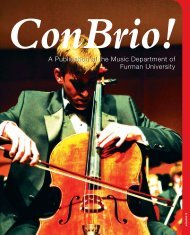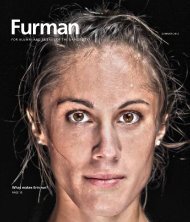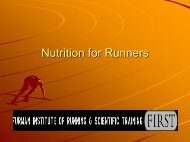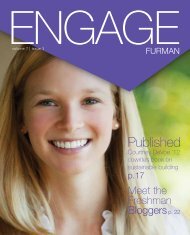Download - Furman University
Download - Furman University
Download - Furman University
- No tags were found...
Create successful ePaper yourself
Turn your PDF publications into a flip-book with our unique Google optimized e-Paper software.
<strong>Furman</strong> REPORTS<strong>Furman</strong> suffers loss of three stalwart members of languages departmentDuring a seven-week period in February and March, the university community was saddened by the deaths of three currentand former members of the Department of Modern Languages and Literatures: David W. Morgan, and emeriti David B. Parselland Carey S. Crantford. In recognition of their years of service and contributions to the university, we offer these tributes.CAREY CRANTFORD had a style allhis own.Maurice Cherry ’65, a sophomorewhen Crantford arrived at <strong>Furman</strong> andlater a faculty colleague, once describedhow Crantford “immediately impressedstudents and colleagues alike with hisenthusiasm for teaching and themagnitude of his interests. I recallhearing my peers label Carey variously asa Renaissance man and a Baroque personality.He intrigued us with his considerable knowledgeof both popular culture and the more refinedworlds of art, music and literature, and we werecaptivated by his off-the-wall, often irreverentsense of humor and ability to posit logical connectionsamong ostensibly unrelated topics.”When Crantford died March 11 at the ageof 87, <strong>Furman</strong> lost one of its wittiest and mostdistinctive personalities — and one of its finestprofessors and scholars.He held a number of positions during his33-year <strong>Furman</strong> career (1962-95): professor ofSpanish and German, longtime chair of thelanguages department, assistant academicdean, and winner of the 1972-73 Alester G.<strong>Furman</strong>, Jr., and Janie Earle <strong>Furman</strong> Awardfor Meritorious Teaching.More informally he was known as the“Master of <strong>Furman</strong>’s Ceremonies,” a designationhe earned because, for almost his entire tenure at<strong>Furman</strong>, he chaired the committee that plannedall major academic events at the university, fromconvocations and graduations to three presidentialinaugurations (Blackwell, Johns and Shi).His meticulous attention to detail and apprecia-Crantford Morgan Parselltion for pageantry and heraldry brought dignityand refinement to <strong>Furman</strong>’s special occasions.He was also influential in developing <strong>Furman</strong>’sstudy away programs, and he was wellknown for his willingness to share his knowledgeof language and culture with the community.Peggy Ellison Good ’67, who in 2001 helpedlead a drive to endow an academic chair inCrantford’s name — a position first held byCherry — recalls how deftly her former professorreached out to students. “He had the uncannyability to connect with each of us in a personalway,” she says. “We all had identifying nicknames,highlighting some personality traitor talent or just something he made up. He knewwho in the class played football or basketball,who was starring in the next play, even whoyou sat with in the dining hall!“Dr. Crantford took great care to help hisstudents see how all of life — the politics, themusic, the art — permeated the literature of anera. He valued students, he loved the language,and he made what we were studying relevant.”A celebration of Crantford’s life will be heldat <strong>Furman</strong> November 9 during HomecomingWeekend. Memorials: Carey Shepard CrantfordEndowed Chair at <strong>Furman</strong>.“DAVID MORGAN is what thoseof us from the Midwest would call‘a great guy.’ Saying someone is‘a great guy’ is to call attentionto that person’s magnanimity.“He’s someone who is generousand thoughtful of others, someoneyou would like your parents or yoursister to meet. A great guy is to bedistinguished from ‘a heck of a guy’— someone who has done something out ofthe ordinary, like bowling a 300 game or outrunninga police officer. And to be distinguishedagain from ‘a good guy,’ which mostly justmeans ‘friendly.’“I mention these distinctions because theyare the kinds of linguistic differences that wouldreally have interested David. He loved words andmeanings, no matter what the language. It wasthe kind of activity David partook of in histeaching, and even more so in his dictionaryof modern Latin, the so-called Morgan Lexicon.”This was how David Spear, William E.Leverette, Jr., Professor of History, began hiseulogy at a memorial service for his friendand colleague, who died of a liver disorderFebruary 6 at the age of 53.Morgan was a Phi Beta Kappa graduateof Wofford College who went on to earn a lawdegree from Vanderbilt. After practicing lawin New York City for four years he returned toschool at Princeton <strong>University</strong>, where he completeda doctorate in French literature. He joinedthe <strong>Furman</strong> faculty in 1994, and in 1998 hereceived the Alester G. <strong>Furman</strong>, Jr., and JanieEarle <strong>Furman</strong> Award for Meritorious Teaching.In the last week of his life, Morgan’s formerstudents filled the “French at <strong>Furman</strong>” Facebookpage with testimonies to his warm, caring nature.Their comments described a mentor and friendwho, in the words of Leanna Kelley Fuller ’96,had “an infectious love of learning, an amazinggift for teaching, [and] a spirit of deep kindnessthat just shone through all he said and did.”Spear echoed those sentiments in recountingMorgan’s courage in his final days: “I watchedDavid take a number of phone calls from friendswhile he lay in his hospital bed. And althoughit was difficult for him to talk, he spoke openly,warmly and candidly about his imminent death.Instead of being concerned about himself, heactually ministered to those he was talkingwith, putting them at ease, reminding themof their virtues.”Spear closed by saying, “David Morgan wasa great guy. He was a generous spirit both in hislife and in his death.”Memorials: <strong>Furman</strong> Chaplains Fund, or acharity of one’s choice.DAVID PARSELL’S intellectual acuity and quirkystyle were well known among <strong>Furman</strong> Frenchstudents from 1969-2008. His death March 29at the age of 71 prompted the following reminiscencefrom writer George Singleton ’80:When I first sat down and watched thesituation comedy “Seinfeld” back in the earlynineties, I saw this character Kramer blow intothe room and, after his first batch of dialogue,said to myself, “David Parsell.” Over the yearsI thought, well, Parsell is like Kramer, exceptParsell is about 100 percent smarter than thischaracter, and he has more heart, and he’squicker and funnier by a mile.Parsell influenced me — and I suspect everystudent he taught — in ways that I’ll neverfathom. When he handed me a copy of Ionesco’sThe Bald Soprano in the spring of 1977, he saidsomething like, “You seem weird enoughto enjoy this play.” And boy, did I. For somereason it never occurred to me that one couldwrite comic work, whether plays, prose or poetry.As the term continued Parsell pointed metoward other works by Ionesco, and then SamuelBeckett. This may be faulty memory, but I amconvinced that he said — or at least thought— “You’re never going to be much of a Frenchscholar, but you might understand the absurdityof life.”Parsell, for me, was one of those rare professorswhose chief strength fell into the “I do notwant to disappoint this man” category. I triedto learn my verb conjugations. I spent a term inVersailles — a program he helped develop —even though I majored in philosophy. I took hiscourse in 19th and 20th century French literature.I burst in on his other classes just to seehow fast he could unravel himself from hispreferred sitting position, atop the desk, inthat double-jointed-at-the-hip manner usuallyperfected by yogis.Being around Parsell was similar to beinginvolved in an ongoing art happening. It waslike being in the midst of a flash mob continually,long before flash mobs became de rigueur.I showed him my bad, juvenile, plotless, slapstickattempts at plays and fiction. He never —never — made me feel as though a life of writingmay be impossible.I will miss those loud, booming “Ummms”that peppered his impeccable French, his geniusEnglish patter. In the afterlife, I hope that theSpirit in charge finds it necessary to say, “Youknow, we tried to use you for a template whenit came to having writers create smart, hilariouscharacters. They couldn’t pull it off. Here’sa trophy, though, for you being you.”Memorials: Greenville Humane Society,or a charity of one’s choice.JEREMY FLEMINGThorpe takes reinsat history museumDANA THORPE, who has more than 28years of experience working in museumsand historical societies, has been appointedexecutive director of the Upcountry HistoryMuseum-<strong>Furman</strong>.Thorpe was previously executivedirector of the Building for Kids Children’sMuseum in Appleton, Wis. She has alsobeen director of the Western ReserveHistorical Society in Cleveland, Ohio,director of exhibits at the John G. SheddAquarium in Chicago, and deputy directorof the Association of Children’s Museums,an international service organization.<strong>Furman</strong> and the museum becamepartners in February of 2012, when theuniversity assumed responsibility forthe museum’s operation and management.The museum is located in downtownGreenville near the site of the GreenvilleWoman’s College; its board of directorsowns the facilities and provides membershipand fundraising support. Museumstaff members are <strong>Furman</strong> employees.<strong>Furman</strong> president Rod Smolla said,“We are pleased to have a person of Dana’scaliber in this position and are confidentthat the Upcountry History Museum underher leadership will strengthen its role asa cultural and educational resource in newand exciting ways.”Smolla and Kathy McKinney, chairof the museum’s board, also expressedappreciation for the work of Ken Johnson,who had served as interim executivedirector since July of 2011.22 FURMAN | SPRING 2013FURMAN | SPRING 2013 23



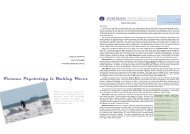
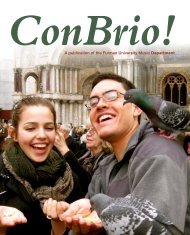
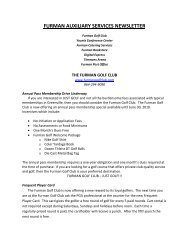
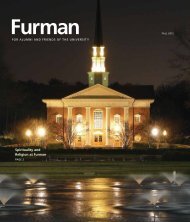

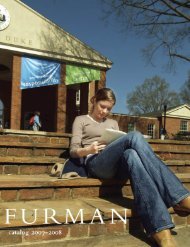
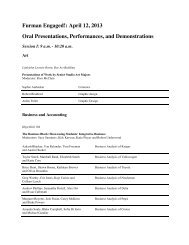

![Guidelines [PDF] - Furman University](https://img.yumpu.com/43814619/1/190x245/guidelines-pdf-furman-university.jpg?quality=85)
